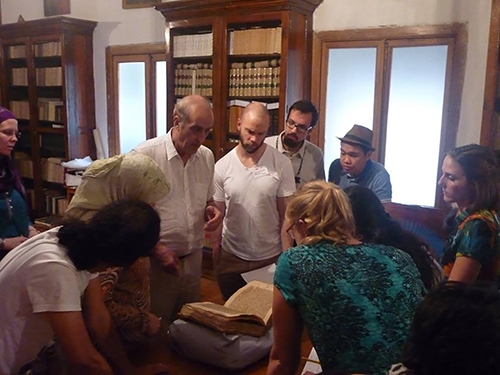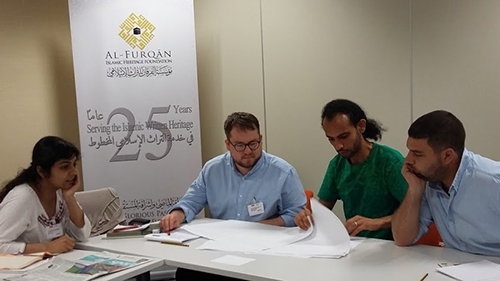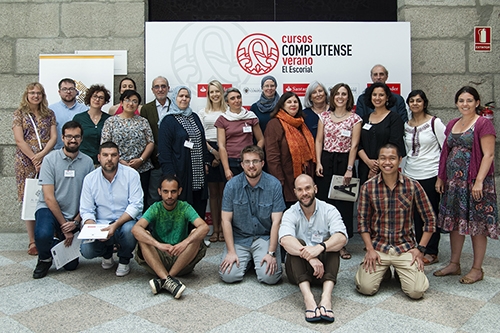The Centre for the Study of Islamic Manuscripts at Al-Furqān Islamic Heritage Foundation, in co-operation with Fundación General de la Universidad Complutense de Madrid, organised the third training course on codicology, titled “Arabic Codicology: The Islamic Manuscript Heritage in the El Escorial Collection”.
The course took place from the 18th to the 22nd of July 2016, at San Lorenzo de El Escorial (situated 45km north-west of the capital Madrid, Spain), within the framework of the Complutense University Summer Courses.

The course was attended by 18 selected delegates coming from different countries (including Morocco, the United Kingdom, Lebanon, the United States of America, Spain, Tunisia, France, the Philippines, Denmark and Canada) and specialised in different subject areas involving research on Arabic manuscripts. This year, the course was taught by Professor François Déroche and Professor Nuria Martínez-de-Castilla-Muñoz (also Director of the Course).
The Course was structured in theoretical and practical sessions. The theoretical sessions provided an overall introduction to the science of codicology of Islamic Manuscripts, with particular focus on the basic elements of a manuscript, including the material of the codex (whether paper, parchment or papyrus), the type of binding, the foliation and quires of the codex, as well as the types of script and the main elements of the paratext including the title page, the colophon and the documentary notes.
The practical sessions consisted of analysing and describing selected Arabic manuscripts found in the collection of the Royal Library of San Lorenzo Monastery in El Escorial, one of the most important collections of Arabic manuscripts in Europe, and the largest in Spain. Participants were divided into groups and given manuscripts to analyse in accordance with the elements studied in the morning theoretical sessions, i.e. type of paper, type of script, documentary notes, illuminations, etc. They were asked to present the findings of their analysis to the other participants and professors, under the guidance of Professor François Déroche and Professor Nuria Martínez-de-Castilla.

The Arabic manuscript collection at the Royal Library in El Escorial, founded by Philip II around 1565, includes valuable volumes, such as the autograph copy of the Lubāb al-Muḥaṣṣal fī Uṣūl al-Dīn (Gist of the Compendium of the Principles of Theology) by Ibn Khaldūn in 752 A.H./1351 A.D., which was shown to the participants during one of the practical sessions in the Library; a copy of Kitāb al-Maqāmāt by al-Ḥarīrī, transcribed during the life of its author in 483 A.H./1090 A.D., and many other valuable titles.
The Course started on Monday morning, 18 July, with the welcoming words of the Course Director, Professor Nuria Martínez-de-Castilla-Muñoz, the Course Co-ordinator, Mr Carlos Leo Roca, and the representative of Al-Furqān Islamic Heritage Foundation, Ms Karima Benaicha, Head of the Library and Online Database Department, who thanked the participants and gave them a brief introduction on the Foundation’s main activities and centres.
The first lecture was delivered by Professor Nuria Martínez-de-Castilla-Muñoz, who introduced the history of the Arabic manuscript collection at the Royal Library of San Lorenzo Monastery in El Escorial. This was followed by general remarks on the whole collection of manuscripts at the Royal Library, by the Director of the Library, José Luis del Valle Merino. Professor François Déroche then continued with a lecture on writing surfaces (parchment and paper). The first day ended with a presentation titled “Al-Furqan Digital Library Portal: World Islamic manuscript collections, catalogues and written heritage resources” delivered by Ms Karima Benaicha.
During the morning sessions of the days of the Course, Professor François Déroche delivered lectures on the following topics: the basis of codex composition, inks and lay-out, Arabic palaeography, decoration of manuscripts, Arabic bindings, notes and colophons, and history of manuscripts. Professor Nuria Martínez-de-Castilla-Muñoz integrated the lectures with comments and remarks on each topic. In addition, Alison Ohta, curator at the Royal Asiatic Society and participant on the course, presented a paper on Mamluk bindings, during the session on bindings.
The course ended on Friday 22 July, with the delivery of certificates to the participants. It was concluded with speeches by Professor Nuria Martínez-de-Castilla and Ms Karima Benaicha, who thanked the attendees for their active participation on the course and exchange of their experiences as researchers of the Islamic written heritage. She also thanked the Complutense University Summer Courses and the El Escorial Library for hosting the event for the third consecutive year.

A group picture of the participants during the training course

